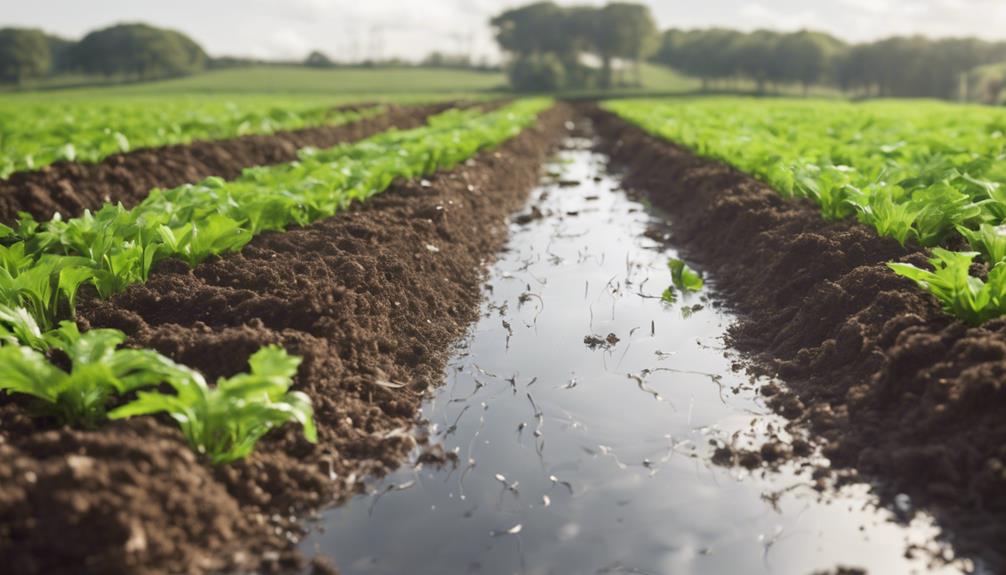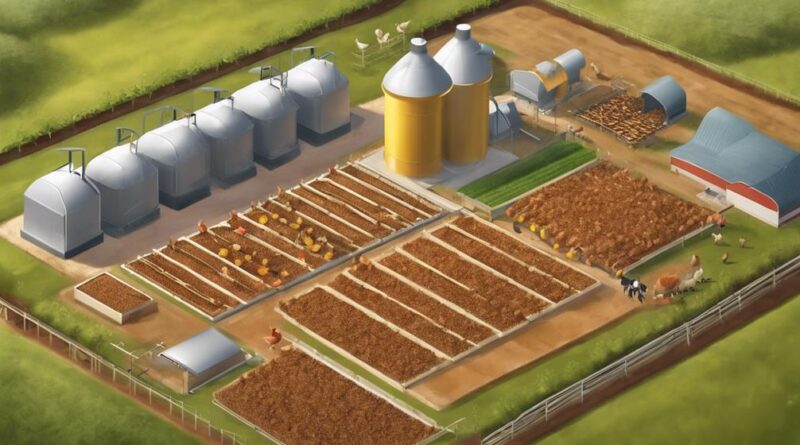Why Is Sustainable Chicken Waste Disposal Essential?"
Properly managing chicken waste is crucial for the environment, as it helps prevent pollution and maintains ecological balance. Sustainable disposal methods are essential to reduce environmental risks and enhance agricultural sustainability. By composting and utilizing waste efficiently, you can reduce greenhouse gas emissions, improve soil health, and increase crop productivity. Challenges like excess waste and contamination can be addressed with innovative solutions such as anaerobic digestion. Consider the impact on soil and water quality, and how strategic waste management can mitigate negative effects. Understanding the economic aspects of waste management is also key for long-term sustainability and resource conservation.
Environmental Impact of Chicken Waste
When managing chicken waste, understanding its environmental impact is crucial for implementing sustainable disposal practices. Chicken waste, if not managed properly, can have detrimental effects on agricultural sustainability, pollution control, waste reduction, and ecological balance.
The improper disposal of chicken waste can lead to an overabundance of nutrients in the soil and water systems, causing pollution and disrupting ecological balance.
A key aspect of the environmental impact of chicken waste is its contribution to agricultural sustainability. While chicken waste can be a valuable source of nutrients for crops when used in moderation, excessive application can lead to nutrient imbalances in the soil, affecting crop growth and soil quality. By understanding how chicken waste affects soil health, farmers can make informed decisions to optimize its benefits while minimizing negative impacts.
Moreover, pollution control is another critical consideration when dealing with chicken waste. High concentrations of nutrients such as nitrogen and phosphorus from chicken waste can leach into water bodies, leading to eutrophication and algal blooms. These phenomena not only harm aquatic ecosystems but also pose risks to human health. Implementing proper disposal methods, such as composting or controlled application, can help mitigate these pollution issues.
Importance of Proper Disposal Methods
Proper disposal methods for chicken waste are essential in mitigating environmental risks and promoting sustainable agricultural practices. Implementing waste reduction strategies is crucial to minimize the negative impact of chicken waste on the environment. By reducing the amount of waste generated, less strain is put on natural ecosystems, decreasing the likelihood of pollution and contamination.
One effective method of disposal is through composting. Composting offers a range of benefits, including the transformation of organic waste into nutrient-rich soil amendments. This process not only helps in reducing the volume of waste but also creates a valuable resource that can be used to enhance soil fertility and crop productivity. Additionally, composting helps in the reduction of greenhouse gas emissions that would otherwise be released if the waste were left to decompose in landfills.
Benefits of Sustainable Waste Management
Implementing sustainable waste management practices is crucial for reducing environmental impact and promoting long-term agricultural sustainability. By adopting sustainable methods, such as resource conservation and waste reduction, farmers can significantly benefit both the environment and their own operations.
Resource conservation plays a vital role in sustainable waste management. Through practices like composting chicken waste to create nutrient-rich fertilizer, farmers can close the loop in their production cycle. This not only reduces the need for external fertilizers but also minimizes the overall environmental footprint of the farm. Additionally, by reusing waste in this manner, farmers contribute to a circular economy where materials are used efficiently and waste is minimized.
Furthermore, sustainable farming practices not only benefit the environment but also the farmers themselves. By managing waste effectively, farmers can improve soil health, leading to better crop yields and long-term sustainability of their land. This not only reduces costs associated with external inputs but also fosters a more resilient agricultural system.
Challenges Faced in Waste Disposal
Addressing the challenges in chicken waste disposal requires strategic planning and innovative solutions to ensure environmental sustainability and regulatory compliance. One of the primary challenges faced in waste disposal is the sheer volume of chicken waste produced by large-scale poultry farms. This excess waste can strain existing disposal methods and lead to environmental pollution if not managed effectively. Additionally, the high moisture content of chicken waste makes it prone to releasing odors and attracting pests, further complicating disposal efforts.
Another significant challenge is the potential contamination of soil and water sources from untreated chicken waste. Harmful pathogens and excess nutrients present in the waste can leach into the soil and groundwater, posing risks to human health and local ecosystems. To address these challenges, several solutions can be implemented. One effective approach is the use of composting techniques to convert chicken waste into nutrient-rich fertilizer. Composting helps reduce the volume of waste, eliminates pathogens through proper decomposition, and produces a valuable product for agricultural use.
Furthermore, technologies like anaerobic digestion can be employed to generate biogas from chicken waste, providing a sustainable energy source while reducing the waste's environmental impact. By investing in these innovative solutions and adopting best practices in waste management, the poultry industry can overcome the challenges associated with chicken waste disposal and move towards a more sustainable and environmentally friendly approach.
Innovations in Chicken Waste Recycling
What innovative methods are being developed to recycle chicken waste effectively and sustainably? In recent years, there's been a significant focus on utilizing a circular economy approach and leveraging technological advancements to address the challenge of chicken waste disposal. One key area of innovation is resource recovery, where waste materials are seen as valuable resources that can be reintegrated into the production cycle.
Technological advancements have played a crucial role in transforming chicken waste into useful products. Through processes like anaerobic digestion, chicken waste can be converted into biogas, which can then be used for heating, electricity generation, or as a vehicle fuel. This bioenergy production not only helps in managing waste but also contributes to renewable energy generation, aligning with sustainability goals.
Moreover, the circular economy approach encourages the transformation of chicken waste into valuable products like organic fertilizers. These fertilizers can replace synthetic alternatives, promoting a more sustainable agricultural system. By closing the loop and reusing waste as a resource, this approach minimizes environmental impact and reduces the need for external inputs.
Regulations for Waste Handling
To ensure proper management and disposal of chicken waste, understanding and compliance with waste handling regulations is imperative. Waste disposal guidelines are put in place to safeguard the environment and public health. These regulations dictate how chicken waste should be collected, stored, treated, and disposed of to prevent contamination and promote sustainability. Compliance with these guidelines is crucial to minimize the negative impact of chicken waste on the ecosystem.
Advancements in waste management technology have made it easier for poultry farms to adhere to these regulations. Innovations such as anaerobic digestion, composting, and nutrient recovery systems have revolutionized the way chicken waste is handled. These technologies not only help farms meet waste disposal guidelines but also allow them to convert waste into valuable resources like biogas, organic fertilizers, and bioenergy.
Impact on Soil and Water Quality

Mitigating the impact of chicken waste on soil and water quality requires strategic management practices and continuous monitoring. Chicken waste, if not properly managed, can have detrimental effects on soil health and lead to water contamination.
Chicken manure is rich in nutrients like nitrogen and phosphorus, which can be beneficial for soil fertility when applied in moderation. However, excessive accumulation of these nutrients can lead to soil degradation and nutrient imbalances, impacting the overall soil health. High levels of nitrogen can leach into the groundwater, causing water contamination issues such as algal blooms and reduced water quality.
To prevent these negative outcomes, it's essential to implement sustainable waste disposal practices such as composting, proper land application techniques, and utilizing chicken manure as organic fertilizer. These practices help in recycling nutrients, improving soil structure, and reducing the risk of nutrient runoff into water bodies. Continuous monitoring of soil and water quality parameters is crucial to ensure that chicken waste disposal methods are effective in safeguarding the environment.
Economic Aspects of Waste Management
Effective management of chicken waste from an economic perspective involves assessing cost-effective strategies for disposal and utilizing resources efficiently. Cost efficiency plays a crucial role in waste management practices, impacting the overall sustainability of chicken farming operations. By implementing cost-effective strategies, such as composting or anaerobic digestion, farmers can reduce expenses associated with waste disposal while also benefiting from resource recovery.
Cost efficiency in waste management can be achieved through various means. For instance, utilizing chicken manure as a fertilizer can reduce the need for commercial fertilizers, thereby cutting down on costs. Additionally, implementing anaerobic digestion systems can help generate biogas from chicken waste, providing an alternative energy source that can further contribute to cost savings.
Resource recovery is another essential aspect of economic waste management. Chicken waste contains valuable nutrients that can be recycled back into the farming system through composting or other recycling methods. By recovering these resources, farmers can reduce their dependence on external inputs, save money on fertilizers, and improve soil health in the long run.
Frequently Asked Questions
How Does Sustainable Chicken Waste Disposal Affect Local Wildlife?
When you implement sustainable chicken waste disposal methods, you're positively impacting local wildlife. By ensuring proper waste management, you contribute to wildlife conservation and habitat preservation.
Improper disposal can harm ecosystems and upset the ecological balance. Sustainable practices promote ecosystem health, which in turn supports various species that rely on these habitats.
Ultimately, your actions can play a crucial role in maintaining a harmonious relationship between chicken farming and local wildlife.
Can Improper Waste Disposal Lead to Public Health Risks?
Improper chicken waste disposal can indeed lead to public health risks and have severe environmental impacts. When not managed sustainably, chicken waste can contaminate water sources, leading to the spread of diseases among humans.
Additionally, the release of harmful gases into the air from improperly disposed waste can impact air quality, posing health risks to the public. Sustainable disposal methods are crucial to mitigate these risks and protect both public health and the environment.
Are There Any Innovative Technologies for Odor Control in Waste Management?
When it comes to odor control in waste management, there are innovative solutions available. Biodegradable alternatives offer a sustainable approach, minimizing environmental impact.
Additionally, ozone treatment technology is gaining popularity for its effectiveness in neutralizing odors. By incorporating these methods, you can address odor issues efficiently while also promoting eco-friendly practices in waste disposal.
Consider exploring these options to enhance your waste management strategies.
What Role Do Consumers Play in Promoting Sustainable Waste Practices?
Consumer awareness is key in promoting sustainable waste practices. By educating yourself on waste reduction initiatives and making informed choices, you can influence businesses to adopt more eco-friendly methods.
Your purchasing power can drive companies to prioritize sustainability, leading to a positive impact on waste management.
Stay informed, support environmentally conscious brands, and advocate for responsible waste disposal to play a crucial role in creating a more sustainable future.
How Does Climate Change Impact the Need for Sustainable Waste Disposal?
Climate change intensifies the urgency for sustainable waste disposal. As global temperatures rise, extreme weather events become more frequent. Effective waste management is crucial for climate adaptation, minimizing environmental impact.
Sustainable practices help reduce greenhouse gas emissions from waste, mitigating climate change effects. Implementing efficient waste disposal systems is vital to combat the escalating challenges brought about by climate change.
Conclusion
In conclusion, sustainable chicken waste disposal is essential for minimizing environmental impact, preserving soil and water quality, and promoting economic efficiency.
By implementing proper waste management practices and adhering to regulations, we can mitigate the challenges associated with chicken waste disposal.
Innovations in recycling methods offer promising solutions for turning waste into valuable resources.
It's crucial to prioritize sustainable waste disposal in order to protect our environment and ensure a healthier future for all.
